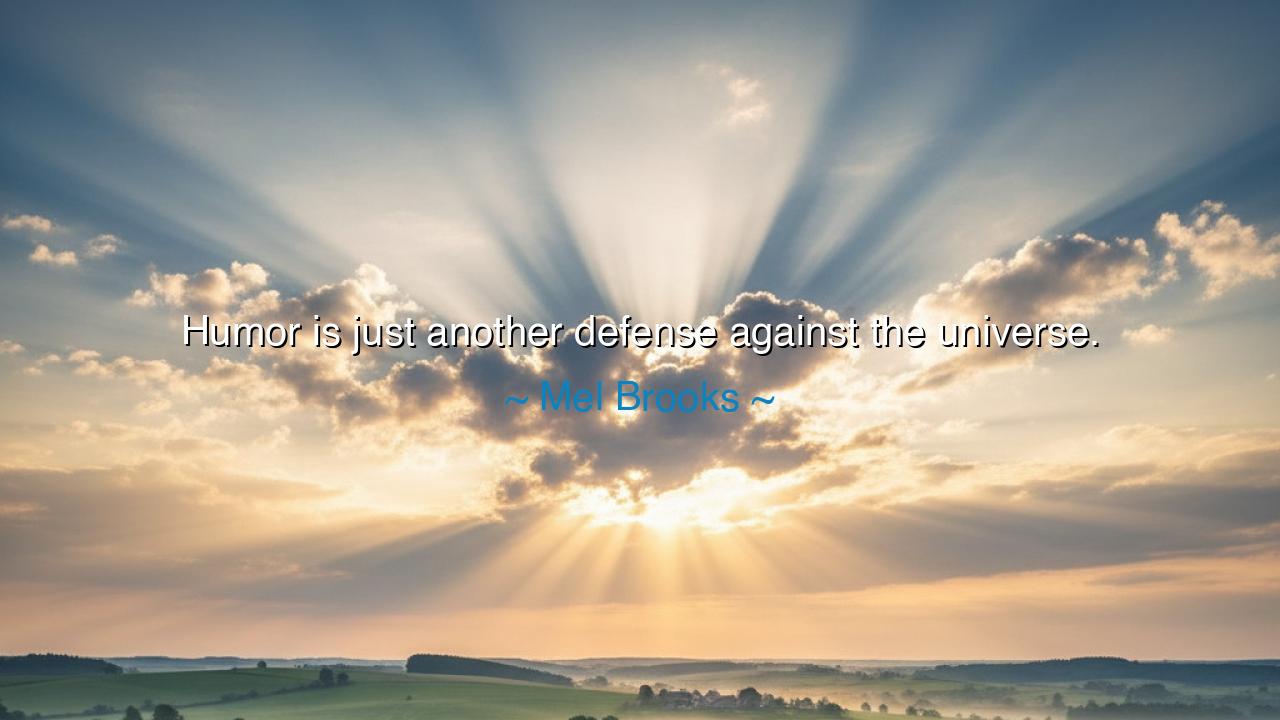
Humor is just another defense against the universe.






“Humor is just another defense against the universe.” Thus spoke Mel Brooks, the great jester-philosopher of the modern age, who clothed his wisdom in laughter and his pain in jest. Though his words are wrapped in mirth, they echo with the solemn music of endurance — the ancient art of facing suffering not with despair, but with defiance. For when Brooks says that humor is a defense, he speaks not of cowardice, but of courage — the sacred courage to smile while the heavens fall, to laugh in the face of fate’s cruelty, and to find light where darkness would otherwise reign.
To the ancients, the universe was vast, indifferent, and mysterious — a force that gave life and death without reason. In such a cosmos, men learned early that control was an illusion. Storms, plagues, wars, and losses struck without mercy. And so, humanity forged many defenses: faith, to find meaning; philosophy, to understand; art, to immortalize; and humor, to survive. For laughter is not a denial of suffering, but a weapon against it — the soul’s way of saying, “You may wound me, but you cannot break me.” Thus, Brooks, with his comic mask, stands in the lineage of all who used wit to confront chaos and to reclaim their humanity from the void.
Consider, for instance, the tale of Diogenes the Cynic, the ancient philosopher who lived in a barrel and mocked kings to their faces. When Alexander the Great stood before him and asked what favor he could grant, Diogenes simply replied, “Stand out of my sunlight.” To the conqueror of the world, he offered not fear, but humor — and in that laughter lay his victory. Though he had nothing, he was free. So too did Mel Brooks, a child of Jewish immigrants who knew poverty and the shadows of war, use laughter as rebellion. In the wake of terror and loss, he made the world laugh — not to forget, but to heal. His comedies mocked tyrants, ridiculed hatred, and taught that humor can strip evil of its majesty.
This is why Brooks called humor a defense: it shields the heart when all else fails. When grief rises like a tide, laughter becomes the last island of sanity. When fear prowls in the night, humor lights a candle against it. Even the great tragedians knew this truth. Shakespeare, who plumbed the depths of human sorrow, always gave his audiences a fool — a simple man who could laugh at kings and fate alike. The fool was not a clown for laughter’s sake; he was a philosopher in disguise, reminding all that only those who can laugh at the world can truly endure it.
Indeed, history is filled with those who found refuge in humor amid ruin. Viktor Frankl, survivor of the Nazi camps, once wrote that laughter was one of the few freedoms left to the imprisoned soul. In the darkest barracks, prisoners would share jokes, mocking their captors, mocking death itself — not because they were blind to horror, but because they refused to let horror define them. Mel Brooks, himself of Jewish heritage, inherited this wisdom from his ancestors: that when life strips you bare, laughter clothes the spirit. In the jest, there is defiance; in the giggle, a spark of immortality.
To understand this, my children, is to understand the essence of resilience. The universe is vast and uncaring, but laughter reminds us that our spirit is neither small nor silent. To laugh in the face of misfortune is to claim dominion over the one thing we truly possess — our response. Where despair says, “I am defeated,” humor says, “I am still here.” This is why Mel Brooks, in his jesting wisdom, calls humor a defense: it is the shield forged not of iron, but of light — invisible, yet indestructible.
So learn this lesson well. When the world weighs heavy upon you, when sorrow or fear would bend your back, do not curse the heavens — laugh. Not with cruelty, nor with scorn, but with the laughter of one who knows that pain does not have the final word. Tell stories that mock despair; speak jokes that reveal truth; let your humor be an act of creation in a universe of destruction. For those who can laugh in darkness are not fools — they are warriors of the soul, wielding joy as both sword and shield.
Thus, remember Mel Brooks’s sacred jest: “Humor is just another defense against the universe.” It is the defense of the free spirit, the armor of the hopeful, and the song of those who will not bow to fate. To laugh is not to escape reality — it is to master it. For while the stars may burn and fade, and time may consume all things, the laughter of the human heart will echo still — a small, defiant flame that no universe can extinguish.






AAdministratorAdministrator
Welcome, honored guests. Please leave a comment, we will respond soon